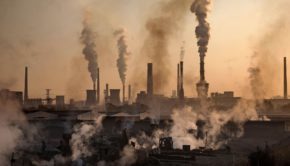As Climate Change Gets Real, So Do Scientists
Are scientists planetary heroes? If their findings can bring about more public awareness in a beneficial way, yes; like researchers at Columbia University whose latest paper states that climate change will not just distort the weather but people’s health, too.
By now, plenty of studies has shown drastic temperature changes can lead to increased seasonal flooding, tropical storms, hurricanes, and more. With disasters occurring more intensely and frequently, residents – especially those who live below 30 m in elevation – become more vulnerable to nature. We’ve already seen the story in history, for instance, during the 2005 Hurricane Katrina which hit the Gulf Coast.
Learning from the past
Katrina was one of the deadliest hurricanes in US history, displacing tens of thousands of people in Mississippi, Louisiana, and Alabama with a lack of basic necessities. Countless families experienced loss of life and serious injuries. Without a viable way to provide people with basic health care at that time, the public health system itself was shaken quite a bit; there was simply no way to predict the coming of Katrina or its effects, much less prepare the resources and, unfortunately, people.
And if climate change continues in the current direction, there will be more unpredictable events like Katrina. Maybe even worse.
But, according to a recent paper entitled “Public Health Adaptation is Needed to Address Future Risks,” researchers at Columbia University state that there is a way to fight the unpredictable; to learn from the past and prepare ourselves for the future.
The paper cites that most large-scale disasters like Katrina are billion-dollar disasters; the Gulf Coasts current experience annual average loss of 14 billion. But when there’s a huge gush or swirling funnel coming your way, the last thing on the mind is the greens. Survival becomes much more important. But to pull through disasters, people need to be relatively healthy. And that’s where climate change really takes the punch.
Elevating temperatures and environmental degradation can weaken people’s immunity to diseases, before disasters even happen.
Changing climate changes health
Simply put, climate change doesn’t have to bring on a hurricane to pose as a health threat. The accompanied heat waves can be a health problem all on its own.
The researchers cite that emergency department visits and ambulance calls usually increase after a heat event. And with very young children, older adults, and those with medical conditions or living in poverty more vulnerable to elevated temperature, roughly ⅓ of coastal populations in the Gulf region is at risk for heat-related diseases.
Temperature-related impacts aside, the study also says people can receive indirect impacts through widespread tropical diseases like malaria and dengue fever, which transmit better in warmth and moisture. As climate change promises more humidity, wetness, and heat, air-borne and vector-borne diseases can alter its transmission behavior, in the least favorable way. This puts even the less-vulnerable population groups in danger.
Of course, health has a psychological aspect as well. Rising sea-levels can lead to large-scale migration, forcing people out of their comfort zones. The scientists elaborate as follows:
“Place attachment is a bond between people and their natural environment, based on cognition and affect. The subsequent loss of this bond can have a negative impact on mental health.”
They warn that climate change threatens large-scale migration, which can put additional pressures on the already stressed vital health and social services. Groups like the economically disadvantaged will have a harder adaptation time due to less resources.
But, amidst the grueling statistics, the Columbia researchers reveal scientific methods to “outsmart” nature, with adaptive measures.
Adapting for survival
Climate change is kind of like a learning scenario for us to polish our decision making abilities. We have historical data, scientific tools, and projected events and outcomes, which enables us to adapt beforehand.
The university researchers categorized “adaptation strategies” into autonomous and planned. Migration as a result of a major hurricane is an example of an autonomous adaptation, says the team, while the implementation of a hurricane warning system is an example of planned adaptation. Basically, they state that while autonomous adaptation has forced effects, we can (and should) build more planned adaptation methods to decrease the effects of climate change.
Here are some recommended adaptive measures:
1. Preparing communities
Educational programs and risk communication are effective strategies to reduce climate-related risks. For example, the Florida Department of Elder Affairs currently collaborates with Florida’s emergency operations center to better address the needs of older adults in emergency situations.
The researchers emphasize the need to focus on vulnerable groups mentioned previous as “such individuals will likely suffer disproportionately from the impacts of changing weather patterns due to climate change.”
2. Strengthening public health systems
Public health systems should be prepared to address health threats and climate-related epidemics prior to events. Through such related programs, proactive measures can be put into place like a heat wave early warning system, as they suggest.
3. Improving infrastructure resilience
Making infrastructures resilient can help minimize loss from extreme weather events. Governments can use historical data to determine how to lessen disaster impact and health consequences from climate change.

Perhaps one of the paper’s most powerful effects is demonstrating how real climate change is getting to be. It’s no longer an outcry or topic of debate; not when countless studies are projecting similar effects. The effects are daunting, but it’s not “too late” yet. And since all events are still in the theoretical future, the most proactive measurement for climate change is, naturally, to stop them from arriving. However, curbing climate change requires a global effort.
Bring a collaborative effect
History has shown that global agreements can be reached. A simple look at the financial and trading system shows that success. Climate change requires the same intercontinental collaboration, where we are no longer trading for measurable goods but the immeasurable balance of the planet.
To this note, efforts are being made. At the top tier, governments have been meeting each year to discuss climate change solutions. And while the rest of the global population are waiting for the critical head nods, groups are also tackling climate change at level one. For instance, studies have proven that by people can reduce their carbon footprint through livestock-independence (eating vegetarian) and waste-independence (using sparingly, recycling frequently). All in all, consumers and leaders have a role to play in curbing climate change and its effects.
That being said, if climate change does happen, we’re all responsible. And in the event that climate change does come knocking, or rather pounding, on our door, we can still be prepared, using effective strategies such as those proposed by the Columbia team. While it’s true that nature isn’t always predictable, but, as the researchers conclude in their paper, “public health adaptation can substantially enhance the capacity of the region to address climate-sensitive health hazards in the future.”
In this ecosystem, having the ability to adapt to change can increase our chance for survival and reduce physical, mental, and emotional discomfort for all.
Related paper: Climate Change and Health on the U.S. Gulf Coast: Public Health Adaptation is Needed to Address Future Risks






![Upcoming Business Marketing Trends [Infographic]](https://technofaq.org/wp-content/uploads/2019/02/The-Future-of-Marketing-Infographic-Scala-150x150.jpg)








